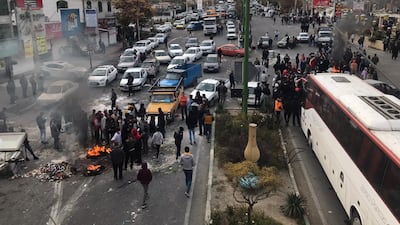Dozens of victims will next week give accounts of Iran’s violent repression of fuel protesters in November 2019 as part of an effort to build cases against regime officials that could be brought before an international court.
The Aban Tribunal in London will hear evidence from 45 witnesses, including accounts of the shooting of protesters by plainclothes security forces, widespread torture in prison and the rounding up of dissidents, backers of the panel said.
A team of six legal experts and human rights activists will issue a final report next year, which rule whether Iran was guilty of international crimes and name those responsible. Although the tribunal has no legal standing, its backers hope it will highlight the brutal nature of the repression and collect evidence that could eventually lead to prosecutions around the world.
A total of 133 officials are under scrutiny, from prison guards and security officials identified on mobile phone footage firing on crowds to leaders including current President Ebrahim Raisi, who was head of the judiciary at the time.
Tribunal officials said all had been contacted to allow them to give their own versions of what happened, but none responded.
The backers of the project take as their inspiration the Russell Tribunal from the 1960s, that investigated the US intervention in Vietnam, and the Iran Tribunal from 2012, which examined the massacre of thousands of prisoners in the late 1980s.
A lowly former official, Hamid Nouri, is currently on trial in Sweden accused of murder and war crimes in connection with the 1988 killings after former prisoners in Iran spent years lobbying and gathering evidence.
The Aban Tribunal was organised by three human rights groups in protest against the failure of the international community to hold Iran to account over the repression. It wants a full investigation under the auspices of the United Nations and sanctions imposed on those chiefly responsible.
Amnesty International said the Iranian authorities killed hundreds of people and arrested more than 7,000 during a campaign of mass repression after tens of thousands demonstrated against a sudden rise in the price of petrol.
It concluded last year that the government committed widespread human rights offences including arbitrary detention, enforced disappearance and torture. It gave details of more than 300 men, women and children killed during the protests.
It said protesters were jailed for up to 10 years after grossly unfair trials and detainees were subjected to torture techniques included waterboarding, electric shocks and pulling out finger and toenails, Amnesty reported.
The tribunal, which will sit in central London from Wednesday, will hear from dissidents who fled Iran in the aftermath of the purge and from those who remain in the country. They will give evidence by video-link with their identities kept secret, said organisers.
Shiva Mahbobi, of the Campaign to Free Political Prisoners in Iran, which is supporting the tribunal, said witnesses were likely to recount stories including of how members of the Islamic Revolutionary Guard Corps walked into a hospital in Shiraz and demanded that doctors hand over those wounded in clashes.
“This process allows us to collection information as evidence that can easily be submitted to an international organisation,” she said. “It also allows witnesses and the families of those who were killed to put forward their accusations and that could encourage others to do so.”
The panel includes high-profile former South African judge Zak Yacoob and Carla Ferstman, an international lawyer who once headed the charity Redress that campaigns on behalf of victims of torture.

